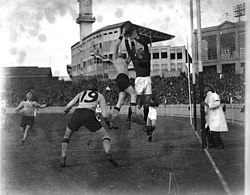| ||||||
| Team information | ||||||
|---|---|---|---|---|---|---|
| Nicknames | Sandgropers Black Swans | |||||
| Governing body | West Australian Football League | |||||
| First game | ||||||
| 1904 [1] | ||||||
The Western Australia Australian rules football team is the state representative side of Western Australia in the sport of Australian rules football.
Contents
- History
- Rivalries
- Victoria
- South Australia
- Carnival history
- AFL Under-18/Under-19 Championships
- Simpson and Moss Medals
- See also
- References
Western Australia has a proud history in interstate football, having a successful historical record and winning three Australian Championships and a State of Origin Carnival Championship, in the State of Origin era. The senior team is scheduled to return in 2026 AFL Origin playing its first match since 1998. The underage sides contest the underage men's (5 division 1 titles) and underage women's championships.
Western Australia has a long and intense rivalry with Victoria. [2] The 1986 game between Western Australia and Victoria is "regarded by many people as one of the greatest games – not just in State of Origin – but in the 150 years of Australian Football". [3]
The team has been known as the "Black Swans" after the Black swan which is the state symbol emblazoned on their guernsey; however, they are more popularly known by their rivals as the "Sandgropers" after the West Australian insect, a nickname also more generally used for West Australians.




